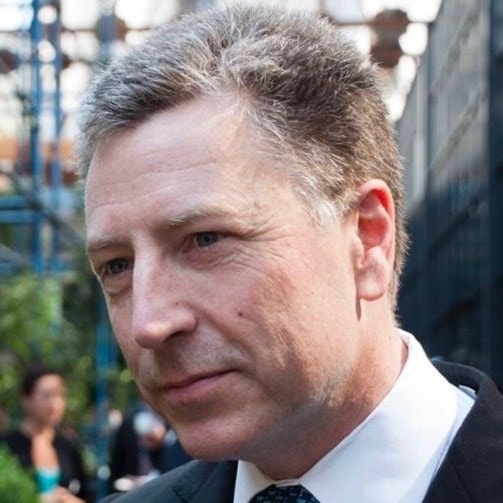Kurt Volker: Don’t let Russia fool you about Minsk agreements

Editor’s Note: This opinion was originally published by the Center for European Policy Analysis (CEPA). The Kyiv Independent is reposting it with the author's permission.
The deals reached several years ago are far from perfect, but they nonetheless offer a way to talk to Russia while pressing it not to invade further.
Following U.S. President Joe Biden’s phone call with Russian President Vladimir Putin on Dec. 7, there is a renewed focus on the implementation of the Minsk agreements as a way of defusing the current Russian military build-up and finding a lasting settlement of Russia’s war in eastern Ukraine.
Minsk is deeply flawed and open to wildly different interpretations. So, the positions of Germany and France (which were midwives to the deal), and especially of the United States are of critical importance in preventing Russia from imposing a unilateral interpretation of the agreements in ways that were never agreed by Ukraine.
Despite their flaws, however, the Minsk agreements are essential to the current diplomatic process surrounding Ukraine for two reasons: First, they are the most recent formal, written document to which Russia has subscribed, which affirms Ukraine’s sovereignty and territorial integrity; second, Russia’s failure to implement the deal is the basis for keeping European Union sanctions in place against Russia. These sanctions must be sustained and strengthened if there is any hope of persuading Russia to end the war.
If the implementation of Minsk is to be given a fresh impetus in international diplomacy under the Biden Administration and a new German government, it is important to debunk Russian disinformation about the Agreements and reiterate exactly what they mean.
There are several key points:
There are two Minsk agreements, not just one.
The first “Minsk Protocol” was signed on Sept. 5, 2014. It mainly consists of a commitment to a ceasefire along the existing line of contact, which Russia never respected. By February 2015, fighting had intensified to a level that led to renewed calls for a ceasefire and ultimately led to the second Minsk Agreement, signed on Feb. 12, 2015. Even after this agreement, Russian-led forces kept fighting and took the town of Debaltseve six days later. The two agreements are cumulative, building on each other, rather than the second replacing the first. This is important in understanding the importance, reflected in the first agreement, of an immediate ceasefire and full monitoring by the Organization for Security and Cooperation in Europe (OSCE), including on the Ukraine-Russia border, as fundamental to the subsequent package of agreements.
Russia is a Party to the Minsk agreements.
The original Minsk signatories are Russia, Ukraine and the OSCE. Russia is a protagonist in the war in Ukraine and is fully obliged to follow the deal’s terms. Despite that, however, Russia untruthfully claims not to be a party and only a facilitator — and that the real agreements are between Ukraine and the so-called “separatists,” who call themselves the Luhansk and Donetsk People's Republics (LPR and DPR), but are in fact Russian supplied and directed.
The LPR and DPR are not recognized as legitimate entities under the Minsk agreements.
The signatures of the leaders of the so-called Luhansk and Donetsk Peoples’ Republics were added after they had already been signed by Ukraine, Russia, and the OSCE. They were not among the original signatories, and indeed Ukraine would not have signed had their signatures been part of the deal. There is nothing in the content or format of the agreement that legitimizes these entities and they should not be treated as negotiating partners in any sense. Russia alone controls the forces occupying parts of eastern Ukraine.
Russia is in violation of the Minsk agreements.
The deals require a ceasefire, withdrawal of foreign military forces, disbanding of illegal armed groups, and returning control of the Ukrainian side of the international border with Russia to Ukraine, all of this under OSCE supervision. Russia has done none of this. It has regular military officers as well as intelligence operatives and unmarked “little green men” woven into the military forces in eastern Ukraine. The so-called LPR and DPR forces are by any definition “illegal armed groups,” that have not been disbanded. The ceasefire has barely been respected by the Russian side for more than a few days at a time.
Russian-led forces prevent the OSCE from accomplishing its mission in Donbas as spelled out in the Minsk Agreements.
It is an unstated irony in Vienna — understood by every single diplomatic mission and member of the international staff — that Russia approves the mandate of the OSCE Special Monitoring Mission (SMM) in Ukraine when it votes in Vienna, but then blocks implementation of that same mission on the ground in Ukraine. Because Russia is a member of the OSCE, and the SMM wants to preserve what little access it has to the occupied territories, the mission is guarded in what it says about ceasefire violations and restrictions on its freedom of movement. Privately, however, they acknowledge that some 80% of such violations and restrictions come from the Russian-controlled side of the border, and those that occur on the Ukrainian side are largely for safety reasons (e.g., avoiding mined approaches to bridges.)
Ukraine has implemented as much of Minsk as can reasonably be done while Russia still occupies its territory.
The agreements require political measures on Ukraine’s side, including a special status for the region, an amnesty for those who committed crimes as part of the conflict, local elections and some form of decentralization under the Ukrainian constitution. But the form of these measures is not specified, and Ukraine has already passed legislation addressing every point. It has passed – and extended with renewals – legislation on special status and amnesty, and already has legislation on the books governing local elections. It has passed constitutional amendments. The Minsk agreements do not require Ukraine to grant autonomy to Donbas, or to become a federalized state. It is Russia’s unique interpretation that the measures passed by Ukraine are somehow insufficient, even though the agreements do not specify what details should be included, and Ukraine has already complied with what is actually specified to the degree it can.
What is lacking in Ukraine’s passage of these political measures is not the legislation per se, but implementation — which Russia itself prevents by continuing to occupy the territory. For example, international legal norms would never recognize the results of elections held under conditions of occupation, yet that is exactly what Russia seeks by demanding local elections before it relinquishes control. Moreover, the elections would not be for positions in the illegitimate LPR and DPR “governments” established under Russian occupation, but for the legitimate city councils, mayors, and oblast administrations that exist under Ukrainian law. Who would vote in such elections? Ukrainian law says all displaced citizens should vote. But would Russian occupation authorities allow this? These are matters for resolution under international supervision – not for Russia to dictate terms.
Some form of neutral peacekeeping or policing force could help bridge between Russian control and Ukrainian control of the occupied territory – but Russia has rejected such proposals.
Because of the impossibility of Ukraine implementing political measures while Russia still occupies its territory, the U.S. — as well as Ukraine, with support from others —proposed deployment of an UN-mandated peacekeeping force to Donbas, so that Russian forces could withdraw, and an UN-backed force could deploy, without an immediate hand-over to Ukrainian control. This could allow time and space for local elections to occur, and for the implementation of special status and amnesty legislation. Russia, however, has consistently rejected such proposals, even labeling an UN-supported peacekeeping force a “military takeover” of the region, when of course it is Russia that has actually taken over the region militarily and unilaterally.
The US diplomatic role is essential.
Germany and France lead the Normandy Format, which brings Russia and Ukraine to the negotiating table under their leadership. In this format, however, Germany and France treat Russia and Ukraine as bearing equal responsibility for the conflict, even though Russian forces are occupying and fighting inside Ukraine, and Ukraine is acting in self-defense. Privately, French and German diplomats acknowledge Russia’s responsibility for the ongoing war, but for diplomatic reasons do not often state this publicly. There are signs that this Franco-German unwillingness to identify the aggressor is feeding through into a refusal to consider detailed sanctions at this juncture and even to deny defensive weaponry to Ukraine.
These are bleak signals. This is why the U.S. diplomatic role in Ukraine negotiations is so important. Only the U.S. can publicly shine a light on and condemn Russia’s military aggression against Ukraine. Germany and France will not do it. The U.S. has the military, political and economic weight that can force Russia to pay attention, and embolden European policies. Exercising this power can shift the diplomatic dynamic onto a more level playing field. Failure to do so means the playing field defaults to Russia.
The only way to end the war is to change Russia’s calculations.
Whether it is peacekeeping or police forces to provide local security; elections under international supervision; creating humanitarian corridors respected by all sides; unfettered freedom of movement for the OSCE’s SMM; or other ideas still to be explored, there is nothing preventing implementation of the Minsk agreements other than Russia’s continued occupation. As soon as Russia chooses to end the war, the rest follows in swift order.
What this means is that the focus should not be on details of the agreements themselves, but on whatever will change Russia’s calculations. Unwinnability, high economic and military cost, improvements in Ukrainian defense forces — all of these can affect Russia’s decisions on whether to end the war or to escalate further using the overwhelming military force it has deployed inside Ukraine and around its borders. Today, Russia calculates that it has all the cards. The West needs to convince Russia that it is wrong.
The job of U.S. diplomacy is not merely to engage in talks, but to illuminate a reality that changes Russian assumptions, so that the Kremlin understands that Ukrainian independence is a fire, that it can be fed, and that reaching into the flames will be a painful — and scarring — experience.










